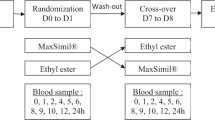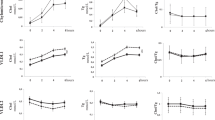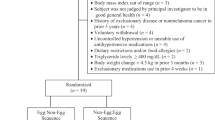Abstract
Objective: Assessing the effect of the dose of dietary triglycerides on preformed vitamin A (retinyl esters) bioavailability in humans.
Design: Four test meals containing 15 000 RE retinyl-palmitate and either 0, 15, 30 or 40 g added triglycerides were ingested by eight healthy volunteers, at different days and in a randomized order.
Setting: The study was done in the Hospital Sainte Marguerite, Marseille, France.
Subjects: Eight healthy male volunteers were recruited by advertisement.
Intervention: Blood samples were collected every hour for seven hours after the test meals intake. Serum and chylomicron (Svedberg flotation unit > 1000) were prepared by centrifugation and retinyl esters were measured by HPLC.
Results: The serum retinyl ester response was not significantly lower after the intake of the meal without added triglycerides (7944±3262 nmol/L h) than after the intake of the fat meals (10012±2182, 7869±3157 and 10777±2067 nmol/L h for the 15, 30 and 40 g-fat meal, respectively), indicating that the serum retinyl ester response was not related to the amount of meal triglycerides. Chylomicron retinyl linoleate response stepwise increased when the amount of meal triglycerides increased while retinyl palmitate and retinyl stearate responses reached a maximum since 15 g triglycerides. Postprandial serum retinol concentration did not change whatever the meal ingested.
Conclusions: (i) a significant amount of preformed vitamin A is apparently absorbed when ingested with trace amount of meal triglycerides only; (ii) meal triglycerides, up to 40 g/meal, do not increase preformed vitamin A bioavailability; (iii) the retinyl ester pattern recovered in the chylomicrons, and probably the esterification process of retinol, is affected by the amount of meal triglycerides; (iv) postprandial retinol homeostasis is not affected by dietary triglycerides.
Sponsorship: French Ministry of Research (grant 9460158)
This is a preview of subscription content, access via your institution
Access options
Subscribe to this journal
Receive 12 print issues and online access
$259.00 per year
only $21.58 per issue
Buy this article
- Purchase on Springer Link
- Instant access to full article PDF
Prices may be subject to local taxes which are calculated during checkout
Similar content being viewed by others
Author information
Authors and Affiliations
Rights and permissions
About this article
Cite this article
Borel, P., Dubois, C., Mekki, N. et al. Dietary triglycerides, up to 40 g/meal, do not affect preformed vitamin A bioavailability in humans. Eur J Clin Nutr 51, 717–722 (1997). https://doi.org/10.1038/sj.ejcn.1600466
Received:
Revised:
Accepted:
Issue Date:
DOI: https://doi.org/10.1038/sj.ejcn.1600466



